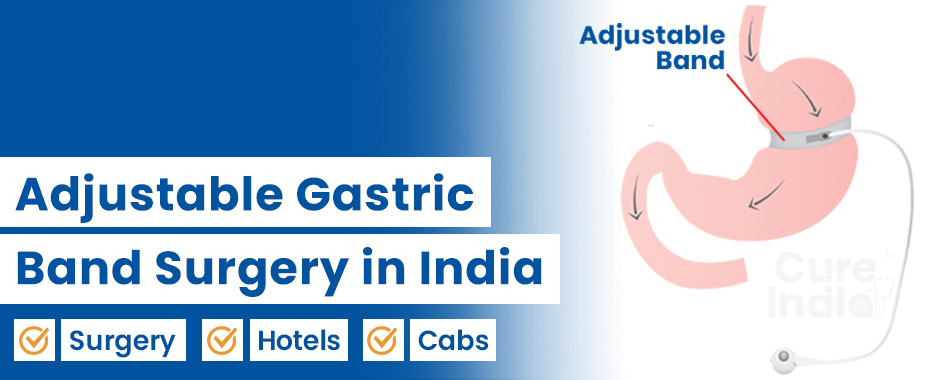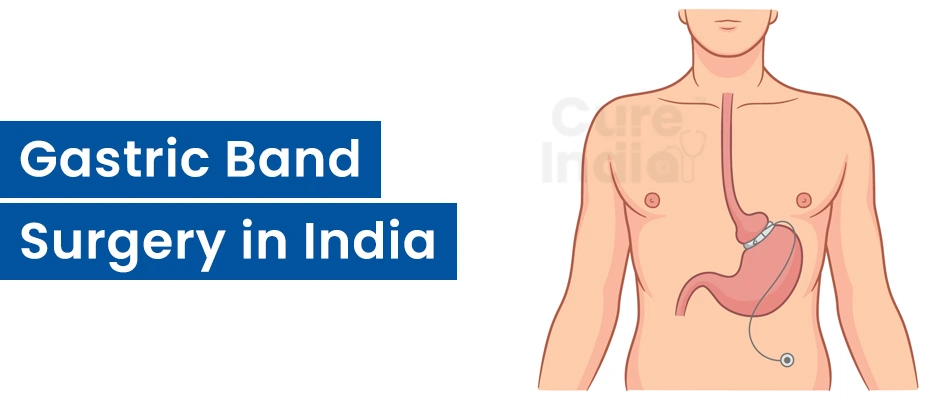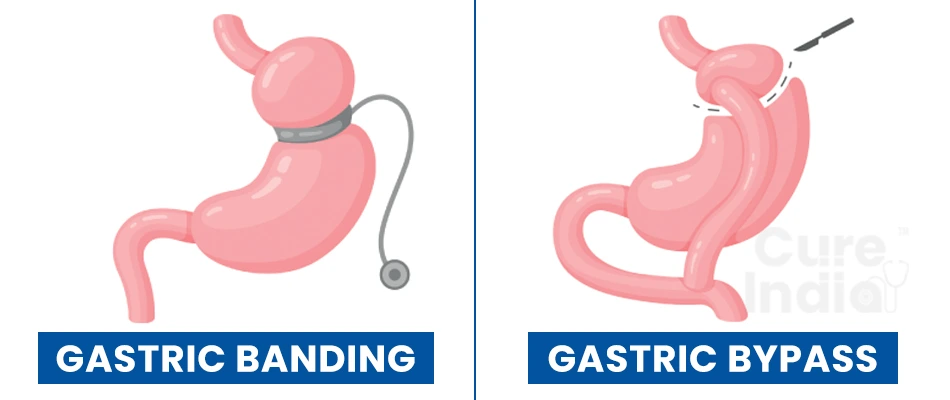

Obesity can be addressed surgically through the use of procedures such as gastric banding, a type of bariatric surgery. In this method, the stomach is constricted so that a person feels full after eating smaller amounts of food. The procedure is performed laparoscopically, using a minimally invasive technique that requires only small incisions to access the abdomen. When the silicone band is tightened around the stomach, it creates a small pouch with an opening about an inch wide. As a result, the stomach can hold only a limited amount of food once it has been banded.

A device placed under the skin then connects to the silicone band through a flexible plastic tube. A sterile salt-water solution can be injected into or withdrawn from the band to adjust its tightness. Filling the band with saline causes it to contract, making it more secure. In this way, the band can be either tightened or loosened as needed. Many African patients travel to India for bariatric surgery for several reasons. First, the cost of gastric banding in India is very low than in many African and Western countries, making it a more affordable option for patients needing surgery for obesity. Second, India has a large network of highly trained bariatric surgeons and hospitals that specialise in minimally invasive weight loss procedures. These factors together have made India one of the leading locations for African patients needing cost-effective bariatric surgery.
If any of the following points apply to you, you can be a perfect candidate for gastric band surgery in India:
If you have specific persistent health issues, it is possible that you will not qualify for the gastric band procedure. These are examples of inflammatory bowel disease, cardiovascular illness, and psychosocial problems. If your physicians are concerned about your mental health, they may want to recommend that you have a psychiatric evaluation.
Suppose you are severely overweight (obese). In that case, your primary care physician may suggest that you see a specialised obesity management clinic to determine whether or not surgery might be of use to you. If the gastric band surgery seems like it would be helpful for you, the NHS might be willing to pay for it. However, this depends on whether it is accessible in your region. It's possible that you can have the procedure done behind closed doors.
Laparoscopic adjustable gastric banding should only be considered if your medical team determines it to be a good choice for you. Weight loss surgery is not recommended for persons who misuse medications or alcohol or cannot commit to a long-term adjustment in their diet and exercise habits. To have bariatric surgery, one must first complete a bariatric education program. These tips will assist you in preparing for surgery and your life after it. In addition, you'll get dietary advice. A mental health examination might also be part of the process. Physical tests and testing will also be required. Bloodwork is required. You may undergo an upper endoscopy or imaging examinations of your stomach.
To prepare for surgery, you must quit smoking at least three months in advance. Your surgeon may request that you shed a few pounds before the procedure. As a result of this treatment, your liver will shrink, and surgery will be more successful. The days before surgery are critical for stopping blood-thinning medications like aspirin, ibuprofen, and others. Preparation for surgery requires that you abstain from eating or drinking after midnight.
Adjustable gastric banding surgery has garnered so much interest because it is an outpatient operation that is both very quick and does not need any significant surgical incisions. The gastric band operation, like other bariatric procedures, is intended to assist a patient in losing weight. Here's how it works:

In the long run, you'll need to have your gastric band changed or removed. The gastric band is one of several medical devices with a shelf life. Many people have the band replaced because it falls off or worsens to the point that it has to be replaced surgically. The lack of success in losing weight and severe side effects may lead some patients to opt for band removal.
Your healthcare practitioner will give you particular dietary guidelines. To begin with, you'll eat just liquids, moving to soft meals and then solids over time. This is to allow your stomach to recover. Reintroducing solid meals will need quantity management because of the new pouch in your stomach. Nausea and vomiting are likely to be side effects of binge eating. To receive adequate nutrients, you'll need to eat correctly and chew your meals thoroughly.
Your gastric band will need to be adjusted often throughout the first year after the stomach ring for slimming. To help you reduce your weight, you may need to tighten your stomach ring. Additionally, you'll undergo frequent blood tests to ensure you receive enough nutrients from your new diet. You may benefit from nutritional coaching to discover new eating habits and improve your overall health. Your healthcare practitioner may prescribe supplements if they deem it appropriate.
The FDA has not yet authorized the use of gastric bands on anybody under 18. In some cases, however, the surgery may still be performed. However, there hasn't been enough done to know if it will benefit or damage teenagers. According to a few studies, weight-loss surgery may have a beneficial effect on the well-being of obese adolescents. A teenager may avoid obesity-related health issues. Type 2 diabetes, obstructive sleep apnea, hypertension, and cardiovascular disease are all on the list. As a result of the operation, bullying and other social issues may be reduced. However, the long-term effects of gastric banding on a growing teen's physique are still unknown.
Choosing whether or not to undergo gastric banding surgery for your kid is a difficult decision. Talk to your adolescent about the procedure, and spend some time understanding what to expect afterwards. You and your adolescent may decide together whether a surgery is the best option.
If you’re considering gastric band surgery in India, choosing the right doctor is important for a safe and successful outcome. India is home to some of the world’s most experienced bariatric surgeons, who are known for their expertise and advanced techniques. CureIndia specialises in connecting patients with top-rated gastric band surgeons across India. Let's hear from some of our best surgeons for gastric band surgery in India:
Dr. Anshuman Kaushal is a top bariatric and metabolic surgery specialist in India. He is known for his expertise in adjustable gastric band surgery, minimally invasive weight loss procedures, and advanced laparoscopic techniques. With experience spanning over 24 years, he is the best doctor for delivering safe, effective, and personalised obesity treatments.

Dr. Rajat Goel is a leading bariatric and laparoscopic surgeon in India with extensive experience of over 23 years in gastric banding, sleeve gastrectomy, and comprehensive obesity management. He is known for his patient-centric treatments and for helping his patients achieve long-term weight loss with evidence-based surgical and non-surgical treatments.

Dr. Sumeet Shah is an expert bariatric surgeon in India who is recognised for his proficiency in gastric band surgery, metabolic interventions, and advanced laparoscopic weight loss procedures. His meticulous surgical skills and thorough pre- and post-operative care contribute to successful and sustained patient outcomes.

Dr. Arun Prasad is an experienced bariatric and gastrointestinal surgeon in India, specialising in gastric banding, minimally invasive bariatric procedures, and long-term obesity treatment. His methodical and strong clinical expertise make him a trusted choice for patients needing safe and effective weight loss treatments.

India is home to many of the world's most reputable healthcare facilities, including hospitals and bariatric surgeons. Superior health care and weight reduction therapy are available for a fraction of what they used to cost. While the process in India is substantially less expensive, packages that include everything you need and decrease the risk of additional expenses not being disclosed upfront are often available.
A Gastric Band Surgery costs about $5,000 in India; however, in the US and UK, it costs around $19,000 and $15,000, respectively. The cost might be lower or more based on several things, such as the expertise level of the surgeon, the kind of hospital you go to, and the state you are now in.
| Treatment Name | Cost in India | Stay in India |
|---|---|---|
| Adjustable Gastric Band Surgery in India | $6,000 | 7 Days |
Laparoscopic gastric banding has the following benefits:
It is essential to have a clear understanding of the long-term commitment necessary to succeed with gastric banding.
Our patients lose around fifty per cent of their extra weight during the initial year, which, in aggregate, corresponds to more than a hundred pounds lost. Based on their eating and exercise routines, on average, most patients lose between five and ten pounds each month.
Patients may see a weight reduction ranging from 1 to 2 pounds each week. However, it is more probable that they would lose one to three pounds per week. The average rate of weekly weight reduction often slows down between twelve and 18 months following the procedure. During your first meeting with the surgeon, we will go through the possible outcomes, how much weight you may expect to lose, and the positive adverse effects you can anticipate experiencing.
There are certain differences between an adjustable gastric banding and procedures like gastric sleeve and gastric bypass surgery. Surgery to create an adjustable gastric band has several benefits; however, several drawbacks are also associated with the procedure. The gastric bypass procedure has been found to result in weight reduction that is faster and sustained over a longer time. The fact that virtually all of the belly and the first 2 feet of the intestine are skipped through contributes to the minuscule amount of malabsorption that results, leading to the remarkable weight reduction that follows. To this day, patients who have had gastric bypass surgery have reported much more consistent weight reduction results than those who have undergone other stomach restriction treatments.

In addition, more than twenty per cent of all adjustable gastric banding procedures performed in the United States are required to undergo modifications during the first few years after the initial process. Revisional surgery may be necessary when there are issues with the device itself or when weight reduction results are inadequate. Weight loss and metabolic medicine specialists often undertake this kind of revision surgery.
